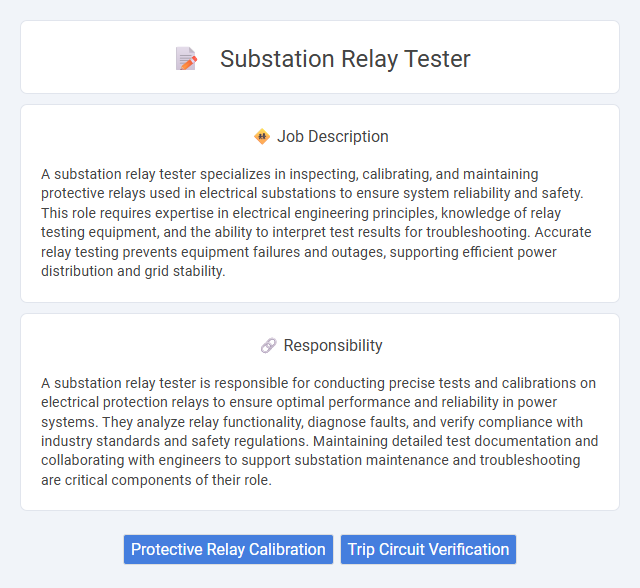
A substation relay tester specializes in inspecting, calibrating, and maintaining protective relays used in electrical substations to ensure system reliability and safety. This role requires expertise in electrical engineering principles, knowledge of relay testing equipment, and the ability to interpret test results for troubleshooting. Accurate relay testing prevents equipment failures and outages, supporting efficient power distribution and grid stability.
Individuals with a strong attention to detail and excellent problem-solving skills are likely suitable for a substation relay tester job. Those who are comfortable working with electrical systems and have a methodical approach to diagnostics may find this role fitting. People who prefer routine tasks or are less inclined towards technical troubleshooting might struggle to adapt in this position.
Qualification
A Substation Relay Tester must possess a strong background in electrical engineering or a related technical field, typically requiring a diploma or degree certified by a recognized institution. Proficiency in relay testing equipment, understanding of protection schemes, and knowledge of substation automation protocols like IEC 61850 are essential for accurate diagnostics and maintenance. Hands-on experience with protective relays, circuit breakers, and transformers enhances the ability to ensure system reliability and compliance with industry safety standards.
Responsibility
A substation relay tester is responsible for conducting precise tests and calibrations on electrical protection relays to ensure optimal performance and reliability in power systems. They analyze relay functionality, diagnose faults, and verify compliance with industry standards and safety regulations. Maintaining detailed test documentation and collaborating with engineers to support substation maintenance and troubleshooting are critical components of their role.
Benefit
Working as a substation relay tester likely offers strong career growth potential due to the increasing demand for maintaining electrical grid reliability. The role probably provides opportunities to gain specialized skills in electrical testing and diagnostics, enhancing job security in the energy sector. Benefits may include competitive salaries and exposure to advanced technologies in power system protection.
Challenge
Substation relay tester jobs likely involve complex troubleshooting of electrical protection systems under high-pressure conditions. Professionals in this role probably face the challenge of ensuring accuracy and reliability in testing to prevent system failures and ensure grid stability. The technical complexity and potential safety risks make this position demanding yet critical for power system management.
Career Advancement
A substation relay tester career offers significant opportunities for advancement through gaining expertise in protective relay systems, automation, and power system diagnostics. Mastery of industry standards like IEEE and IEC, along with skills in advanced testing equipment and software, can lead to roles such as senior relay technician, protection engineer, or substation automation specialist. Continuous professional development and certifications enhance prospects for leadership positions and specialized consultancy roles in the electrical power sector.
Key Terms
Protective Relay Calibration
A Substation Relay Tester specializes in Protective Relay Calibration, ensuring the accurate performance of protective relays that safeguard electrical power systems from faults. This role involves conducting precise testing, adjustment, and verification of relay settings to maintain system reliability and prevent equipment damage. Expertise in relay testing equipment, industry standards, and fault analysis is crucial for optimizing substation safety and operational efficiency.
Trip Circuit Verification
Substation relay testers perform Trip Circuit Verification to ensure the integrity and reliability of protection systems by confirming that trip circuits de-energize correctly during fault conditions. They simulate fault scenarios and measure responses using advanced relay testing equipment to validate proper operation of circuit breakers and relays. Accurate Trip Circuit Verification reduces the risk of equipment damage and enhances overall substation safety and operational efficiency.
 kuljobs.com
kuljobs.com